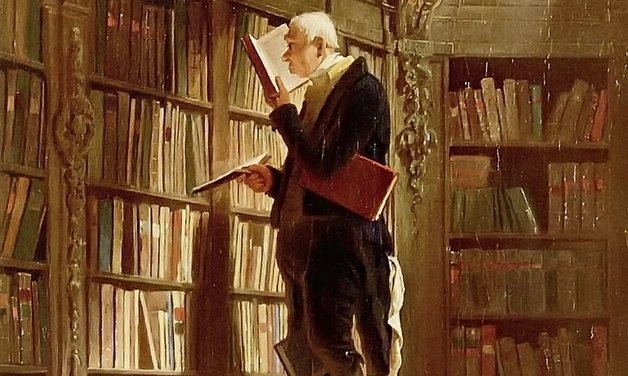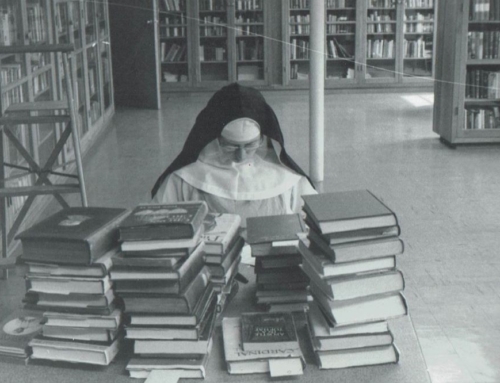Pope Emeritus Benedict XVI refers to his collection of books as his “old friends,” and in this, many friars preachers will surely sympathize with him. Ever since the earliest days of the Order, Dominicans have sought out books to feed the life of the mind and give grist for their preaching. The first friars were enjoined to read constantly, so that through their study, they may share the things contemplated for the salvation of souls. Since Dominicans were sent to preach and teach in universities across Europe, they had to grapple with the best minds and the most persuasive ideas of the day. What’s the use of a preacher if he can’t reach the minds, hearts, and souls of those he preaches to?
The same ethos is present in the Order today, and the friars of the Dominican House of Studies do a brisk trade in books of every sort. The books a preacher reads inevitably inform his preaching. They enrich his language, the timbre and cadence of his words. They broaden his imagination and sharpen his arguments. The books a friar reads gradually shape his voice—in the pulpit, in the confessional, in the classroom. Show me a Dominican’s bookcase, and I’ll tell you what his preaching will be like.
Of course, the first and most important book that shapes any preacher of the Word is Sacred Scripture. Between the liturgy, lectio divina, and private study, the inspired word of God has primacy of place in Dominican life, and rightfully so. St. Thomas Aquinas’ Summa Theologiae also looms large on any Dominican bookshelf, since the Order of Preachers is powerfully shaped by the Angelic Doctor’s particular way of understanding and explaining the drama of salvation history. Even aside from these works, the student brothers are still prodigious readers. Directly and indirectly in the many books they peruse, the brothers find different ways of presenting the Gospel, different ways of seeing Christ in the world.
Ask any student brother for a list of his favorite books, and you’re liable to receive a prolonged reply. To give a manageable sample, I asked a small cross-section of the studentate to share with me some of the most important books on their shelves with respect to preaching, the Bible and the Summa excepted. Unsurprisingly, no two brothers wrote back with all the same titles. I’ve grouped and summarized their replies into four sections, and present them as a portrait of diversity in unity amongst the preachers of tomorrow. At the very least, they should provide good fodder for Amazon Wish Lists and Christmas shopping plans. And since what you hear in the pulpit years from now is shaped by books and authors like these, it counts as a sort of preview of coming attractions.
Dominican Authors
Unsurprisingly, works by Dominican authors feature prominently among the brothers’ favorites. The collected works of Reginald Garrigou-Lagrange, the famed Thomistic theologian, were mentioned by several of the brothers. With his tremendous acumen and great precision, Garrigou-Lagrange makes for a difficult but illuminating read. Titles like Providence and his Last Writings link the grand sweep of Thomist philosophy and theology with the realities of the life of faith. One brother pointed to the early Dominican Lives of the Brethren as a powerful précis of the founding spirit and animating principles of the Order, which still inform our preaching today. The English Province of Dominicans has produced some standout writers in the past century or so, and their works are a happy combination of beautiful prose and excellent content. Friars like Bede Jarrett and Gerald Vann were part of an early twentieth century Renaissance amongst English Dominicans. Their spirit lives on in the work of Simon Tugwell, whose books on prayer in practice and the history of spirituality are tremendously helpful. And across the Irish Sea, Paul Murray’s poetic voice draws out the best of the Dominican tradition.
Spiritual Classics
Not every great work on the spiritual life came from a Dominican pen, of course. Brothers pointed out the importance of the Catechism of the Catholic Church as a rich and reliable guide to all the central questions of the faith. St. Augustine, whom one brother called “the original preacher of grace,” is foundational to the entire Latin tradition in the Church, and one whose vivid writing and personality seem to leap off the page. Another brother included The Sayings of the Desert Fathers, noting their profound wisdom and insight along with their enduring ascetical example. St. Thérèse of Lisieux appears on many bookshelves here for her privileged insight into the truth of God’s love, and several friars have found her to be an unexpected gateway to understanding the passionate vision of St. Thomas that lies hidden beneath his scholastic style.
Again, great British authors inspire many brothers for their eloquence and sanctity. The sermons of John Henry Newman and Ronald Knox are some of the best preaching in the modern English language. Writers like G. K. Chesterton and C. S. Lewis are known the world over for the high caliber of their works and distinctive insights. Less well known is Abbot Columba Marmion, the “doctor of divine adoption” and a master of the spiritual life. Finally, some more recent works were proposed as already being classics for preachers, chief among them Joseph Ratzinger’s Introduction to Christianity.
Philosophy & Politics
In the tradition of St. Thomas, who saw the sound reason of great pre-Christian thinkers as compatible with the faith, the brothers find many secular works useful for preaching. Several of our friars have particular regard for the works of Plato, whose philosophical wisdom has much to offer when read in the light of faith. From my own perspective, the works of the great Anglo-Irish statesman and thinker Edmund Burke have much to offer any reader, but especially a preacher. Aside from his great eloquence and style, Burke’s insights on society and behavior, on government and leadership, and on the sublime and the beautiful are a powerful hermeneutic for understanding the world and its need for the Church and the Gospel. Contemporary authors exploring the faults and fissures of our post-Christian age—like Charles Taylor in A Secular Age and Alasdair MacIntyre in After Virtue—also help would-be preachers better understand the world to which they will speak.
Literature & Poetry
An older friar of our province once observed that it’s essential for preachers to read literature and poetry, both for the good of their own souls and to better tell the story of salvation. One brother praised the Collected Poems of Philip Larkin as “indispensable for learning how to speak about God to men who have forgotten him.” A different brother highlights the work of Jessica Powers, the American poet who became a Carmelite nun. Of course, the epic Divine Comedy by Dante needs no justification to be on any list of essential books.
The brothers’ taste in fiction varies widely. Some mentioned Tolkein’s Lord of the Rings as the best example of modern Catholic imagination, as well as Flannery O’Connor, who (in the words of C. S. Lewis) reminded us that “though God is good, he certainly isn’t tame.” There are the Collected Plays of Brian Friel, notable for “his attention to the dynamic of self-deception and self-representation,” along with Dostoyevsky’s Brothers Karamazov. From the high brow and literary—see Patrick Leigh Fermor’s travel journals, starting with A Time of Gifts—to the more accessible Louis de Wohl and his charming novels on the lives of the saints, the brethren covered a wide range of authors and styles. Finally, one brother thought it prudent for there to be at least one copy of The Complete Shakespeare in every Dominican priory.
Again, this is but a narrow cross-section to show the the great variety of influences that shape a preacher’s voice. These works are a testimony to the power of the written word in forming the spoken word, all in service to the Word made flesh.
✠
Image: Carl Spitzweg, The Bookworm (Der Bücherwurm)







